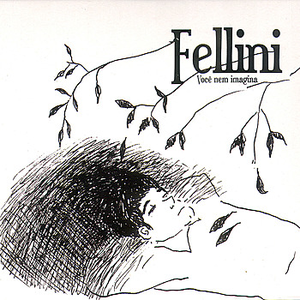Massacres da Coletivização
Fellini Lyrics
Jump to: Overall Meaning ↴ Line by Line Meaning ↴
Mas vira-e-mexe a gente dava uma festa
A ilha na cidade
A araponga e a serra
E não mais barbear-se
A última esperança da Terra
Mas quase sempre se vive sozinho
Não se viram mais ônibus
Ninguém ao pé do rádio
Onde o artista vizinho
Vai cortar seu ouvido
A sagração da primavera
A manhã no hospício
O sonho da quimera
E não tens toca-discos?
E onde tocarão meus discos?
Sem fortuna e sem amigos
Alguém me ajuda a voltar
Num lombo de burro
E dá uma festa ao chegar
Do passado ou futuro?
Alguém me ajuda a voltar
Num lombo de burro
E dá uma festa ao chegar
Do passado ou futuro?
The lyrics of this song, "Massacres da Coletivização," by Fellini, evoke a sense of nostalgia, introspection, and a longing for connection. The opening lines, "Eu não tenho mais fotos dessa época / Mas vira-e-mexe a gente dava uma festa" (I no longer have photos of that time / But every now and then we used to have a party), suggest that the singer no longer has tangible memories of a past era but fondly recalls the joyful times they used to celebrate.
The next lines, "A ilha na cidade / A araponga e a serra / E não mais barbear-se / A última esperança da Terra" (The island in the city / Araponga and the mountain range / And no longer shaving / The last hope of the Earth), create a picture of a place that holds a certain significance for the singer. It seems to symbolize an idyllic, isolated space amidst the chaos of the city, a sanctuary where they could find tranquility and hope.
The subsequent stanza reflects on the interconnectedness of people and the importance of companionship. "Se eu pedia socorro eles vinham / Mas quase sempre se vive sozinho" (If I asked for help, they came / But almost always one lives alone) acknowledges that although help could be summoned, ultimately, one often feels isolated, highlighting the inherent loneliness that can accompany human existence.
The following lines, "Não se viram mais ônibus / Ninguém ao pé do rádio / Onde o artista vizinho / Vai cortar seu ouvido" (Buses no longer pass / No one by the radio / Where the neighboring artist / Will cut off his ear), paint a stark image of a world devoid of communication and artistic expression. The absence of buses and people gathered around the radio implies a disconnect, suggesting a society where interaction and cultural exchange have been severed.
The chorus, "Alguém me ajuda a voltar / Num lombo de burro / E dá uma festa ao chegar / Do passado ou futuro?" (Someone help me go back / On a donkey's back / And throw a party upon arrival / From the past or future?), demonstrates the longing for connection and a desire to return to a time or place that was once familiar or hopeful. The image of travelling on a donkey's back represents a humble, simplistic yearning for a better or different time, accompanied by a celebration upon arrival.
Overall, Fellini's lyrics in "Massacres da Coletivização" convey a wistful reflection on the fleeting nature of memories and the yearning for connection amidst a world that seems disconnected and devoid of hope. It speaks to the universal human desire for companionship, understanding, and the longing for a sense of belonging.
Line by Line Meaning
Eu não tenho mais fotos dessa época
I no longer have photos from that time
Mas vira-e-mexe a gente dava uma festa
But every now and then we would throw a party
A ilha na cidade
The island in the city
A araponga e a serra
The araponga and the mountains
E não mais barbear-se
And no longer shaving
A última esperança da Terra
The last hope of Earth
Se eu pedia socorro eles vinham
If I asked for help, they would come
Mas quase sempre se vive sozinho
But almost always one lives alone
Não se viram mais ônibus
No more buses are seen
Ninguém ao pé do rádio
No one near the radio
Onde o artista vizinho
Where the neighbor artist
Vai cortar seu ouvido
Will cut off his ear
A sagração da primavera
The consecration of spring
A manhã no hospício
The morning in the asylum
O sonho da quimera
The dream of chimera
E não tens toca-discos?
And don't you have a record player?
E onde tocarão meus discos?
And where will my records play?
Sem fortuna e sem amigos
Without fortune and without friends
Alguém me ajuda a voltar
Can someone help me return
Num lombo de burro
On the back of a donkey
E dá uma festa ao chegar
And throw a party upon arrival
Do passado ou futuro?
From the past or future?
Alguém me ajuda a voltar
Can someone help me return
Num lombo de burro
On the back of a donkey
E dá uma festa ao chegar
And throw a party upon arrival
Do passado ou futuro?
From the past or future?
Writer(s): Cadao Volpato, Ricardo Salvagni, Thomas Pappon
Contributed by Chloe S. Suggest a correction in the comments below.
